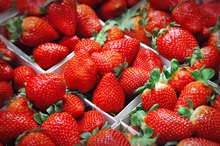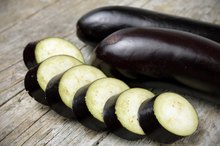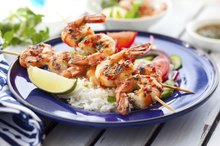What does fact checked mean?
At Healthfully, we strive to deliver objective content that is accurate and up-to-date. Our team periodically reviews articles in order to ensure content quality. The sources cited below consist of evidence from peer-reviewed journals, prominent medical organizations, academic associations, and government data.
- Arthritis and Rheumatism: The Effects of Vitamin C Supplementation on Serum Concentrations of Uric Acid: Results of a Randomized Controlled Trial
- Arthritis and Rheumatism: The Effects of Vitamin C Supplementation on Serum Concentrations of Uric Acid: Results of a Randomized Controlled Trial
- Archives of Internal Medicine: Vitamin C Intake and the Risk of Gout in Men - A Prospective Study
- Archives of Internal Medicine: Vitamin C Intake and the Risk of Gout in Men - A Prospective Study
The information contained on this site is for informational purposes only, and should not be used as a substitute for the advice of a professional health care provider. Please check with the appropriate physician regarding health questions and concerns. Although we strive to deliver accurate and up-to-date information, no guarantee to that effect is made.
Citric Acid and Gout
People who have gout develop uric acid crystals in their joints that cause swelling, redness and pain. Uric acid-lowering medications and a diet low in purine-rich foods are the two primary treatments 1. The NYU Langone Medical Center reports that supplementing with some natural compounds may also help. Citric acid is not considered a treatment for gout, but foods containing the compound may be beneficial. Ask your doctor or a dietitian for help designing a balanced, low-purine diet to deal with gout symptoms 16.
If you are experiencing serious medical symptoms, seek emergency treatment immediately.
Effect of Citric Acid on Gout
According to physician and columnist Paul Donohue, the citric acid found in fruits such as lemons, limes, oranges and grapefruits does not affect your body's level of uric acid and will not worsen gout symptoms. It also does not appear to have a preventative effect against gout. Supplementing with citric acid may, however, help prevent the formation and growth of kidney stones 3. Individuals with kidney stones are often placed on the same low-purine diet as gout patients 1.
Effect of Vitamin C on Gout
Strawberries for Gout
Learn More
While the citric acid in citrus fruits doesn't help treat gout, the vitamin C -- also known as ascorbic acid -- found in those same fruits might be an effective treatment. A study published in "Arthritis and Rheumatism" in 2005 found that people supplementing with 500 milligrams of vitamin C each day for two months experienced a significant reduction in their blood levels of uric acid. Additionally, a 2009 "Archives of Internal Medicine" study determined that men who have a higher intake of vitamin C are less likely to develop gout as they age 5.
Purine Content
All citric acid-rich fruits are recommended on a gout diet because they are low in the purine compounds that the body breaks down into uric acid 1. Low-purine items are defined as those that have 50 milligrams of purines or less in every 100 grams of the food 1. Citrus fruits have an extremely small purine concentration. An orange, for example, has only 19 milligrams of purines per 100 grams. Foods with a moderate level of purines include meat, poultry, beans, legumes and certain vegetables. Organ meats; shellfish, like mussels; and game meats are high in purines.
- All citric acid-rich fruits are recommended on a gout diet because they are low in the purine compounds that the body breaks down into uric acid 1.
- Foods with a moderate level of purines include meat, poultry, beans, legumes and certain vegetables.
Recommended Intake
Pineapple for Gout
Learn More
The University of Pittsburgh Medical Center advises gout patients to consume two to four servings of fruits each day, including those rich in citric acid. A typical fruit serving is equivalent to 1 cup of sliced fruit, a medium-sized piece of whole fruit, 1/2 cup of dried fruit or 1 cup of 100 percent fruit juice. Choose fresh fruit or fruit canned in pure fruit juice over processed, sweetened fruit products. Eat more whole fruit than fruit juice, which has more calories and less fiber per serving.
- The University of Pittsburgh Medical Center advises gout patients to consume two to four servings of fruits each day, including those rich in citric acid.
- A typical fruit serving is equivalent to 1 cup of sliced fruit, a medium-sized piece of whole fruit, 1/2 cup of dried fruit or 1 cup of 100 percent fruit juice.
Related Articles
References
- UPMC: Low-Purine Diet
- Sun Sentinel: Preventing Gout Attacks
- UW Hospital Metabolic Stone Clinic: Citric Acid and Kidney Stones
- Arthritis and Rheumatism: The Effects of Vitamin C Supplementation on Serum Concentrations of Uric Acid: Results of a Randomized Controlled Trial
- Archives of Internal Medicine: Vitamin C Intake and the Risk of Gout in Men - A Prospective Study
- Dial-A-Dietitian: Diet for Gout
- North East Medical Services: Low Purine Diet - Gout Prevention
- National Institute of Arthritis and Musculoskeletal and Skin Diseases. Gout. Updated April 2016.
- Zhang Y, Chen C, Choi H, et al. Purine-rich foods intake and recurrent gout attacks. Ann Rheum Dis. 2012; 71(9):1448-53. doi:10.1136/annrheumdis-2011-201215
- Fischer E. Ueber die Harnsauer. 1 [On Uric Acid. 1]. Berichte der Deutschen Chemischen Gesellschaft. 1884: 17:328-338. doi:10.1002/cber.18980310304
- Ragab, G., Elshahaly, M., & Bardin, T. (2017). Gout: An old disease in new perspective – A review. Journal of Advanced Research, 8(5), 495–511. doi:10.1016/j.jare.2017.04.008
- Centers for Disease Control and Prevention. Gout. Updated January 28, 2019.
- Zgaga, L., Theodoratou, E., Kyle, J., Farrington, S. M., Agakov, F., Tenesa, A., … Campbell, H. (2012). The Association of Dietary Intake of Purine-Rich Vegetables, Sugar-Sweetened Beverages and Dairy with Plasma Urate, in a Cross-Sectional Study. PLoS ONE, 7(6), e38123. doi:10.1371/journal.pone.0038123
- Choi HK, Gao X, Curhan G. Vitamin C intake and the risk of gout in men: a prospective study. Arch Intern Med. 2009;169(5):502–507. doi:10.1001/archinternmed.2008.606
- Zhang Y, Neogi T, Chen C, Chaisson C, Hunter DJ, Choi HK. Cherry consumption and decreased risk of recurrent gout attacks. Arthritis Rheum. 2012;64(12):4004–4011. doi:10.1002/art.34677
- Arthritis Foundation. Gout Diet: Dos and Don’ts.
- Boban M, Modun D. Uric acid and antioxidant effects of wine. Croat Med J. 2010;51(1):16–22. doi:10.3325/cmj.2010.51.16
- Caliceti C, Calabria D, Roda A, Cicero AFG. Fructose Intake, Serum Uric Acid, and Cardiometabolic Disorders: A Critical Review. Nutrients. 2017;9(4):395. Published 2017 Apr 18. doi:10.3390/nu9040395
- U.S. Department of Health and Human Services and U.S. Department of Agriculture. 2015–2020 Dietary Guidelines for Americans. 8th Edition. Published December 2015.
- U.S. Department of Health and Human Services. Gripped by Gout. NIH News in Health. Published February 2014.
- Kakutani-Hatayama M, Kadoya M, Okazaki H, et al. Nonpharmacological Management of Gout and Hyperuricemia: Hints for Better Lifestyle. Am J Lifestyle Med. 2015;11(4):321–329. Published 2015 Sep 2. doi:10.1177/1559827615601973
Writer Bio
Michelle Kerns writes for a variety of print and online publications and specializes in literature and science topics. She has served as a book columnist since 2008 and is a member of the National Book Critics Circle. Kerns studied English literature and neurology at UC Davis.









